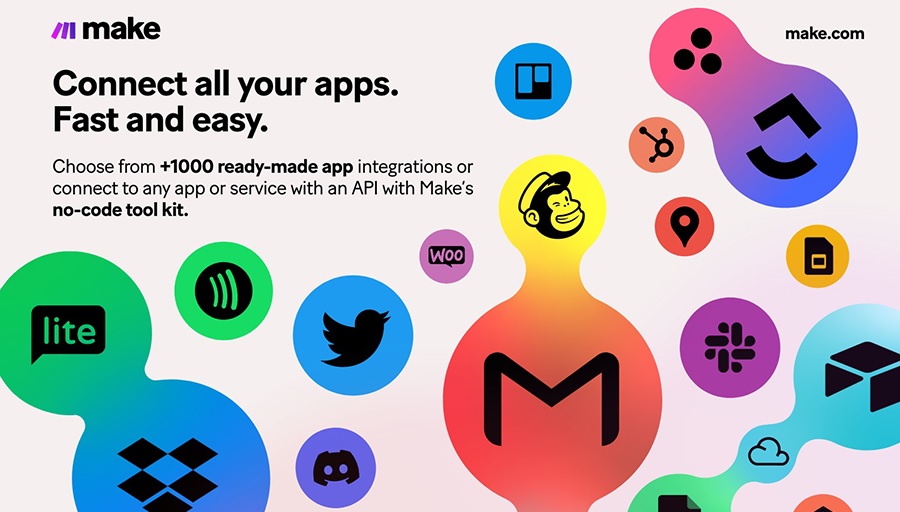
AI agents have moved from being experimental concepts to practical tools that businesses can rely on daily. With Make, real-time AI agents take automation to the next level, responding instantly to events and data flows instead of running on rigid schedules. They are designed to work like digital teammates – monitoring, processing, and acting on information as it happens. But what does this mean in practice? Here we look at the top real-time AI agent use cases in Make and see how they’re reshaping industries one workflow at a time.
Contents
Why Real-Time Matters
Before diving into scenarios, it’s important to understand the distinction between traditional automation and real-time orchestration. Scheduled automations run at specific intervals, like every 15 minutes. Real-time agents, by contrast, act the moment something happens. This responsiveness ensures faster decisions, better customer experiences, and more efficient operations. In industries where timing is everything, real-time isn’t just a bonus – it’s essential.
👉 Sign up for a free Make account
Customer Support Use Cases
Customer support is one of the most popular applications of Make’s real-time AI agents. Companies that provide fast, accurate responses build stronger relationships with their customers while also reducing support costs.
1. Automated ticket routing
When a customer submits a support request, a Make agent can analyze the content immediately, categorize the issue, and route it to the right department. Urgent issues are escalated within seconds, while FAQs are answered with automated replies, reducing the workload for human agents.
2. Chatbot handoffs
AI-powered chatbots can handle basic queries. When questions get complex, Make agents transfer the conversation to a human agent, providing them with all context from the chat history. This seamless handoff ensures customers don’t have to repeat themselves.
Sales and Marketing Use Cases
Sales and marketing thrive on timing. Engaging a prospect at the right moment can make or break a deal. Make’s real-time AI agents ensure no opportunity slips through the cracks.
3. Lead enrichment
As soon as a new lead fills out a form, a Make agent can enrich the data by pulling details from external sources like LinkedIn or industry databases. Sales reps receive a fully qualified profile within moments, giving them a head start on outreach.
4. Personalized engagement
When prospects interact with your website or content, Make agents can trigger personalized follow-ups in real time. For example, if someone downloads a whitepaper, the agent can send a thank-you email and notify a salesperson if the lead meets specific criteria.
Operations and Logistics Use Cases
Operations teams depend on accurate and timely data. Make agents streamline processes by removing manual monitoring and acting instantly on changes in the system.
5. Inventory alerts
A Make agent can monitor stock levels and trigger purchase orders the moment inventory dips below a threshold. Instead of discovering shortages later, businesses can act immediately, preventing lost sales and disappointed customers.
6. Shipment tracking
Logistics workflows often involve multiple carriers. A Make agent can pull real-time tracking updates, update customer portals, and notify teams of delays instantly. This reduces “where is my order” inquiries and boosts customer satisfaction.
Finance and Accounting Use Cases
Finance relies on accuracy and speed. Real-time AI agents in Make help streamline routine financial processes, catching issues before they snowball into bigger problems.
7. Invoice processing
Make agents can read incoming invoices, validate amounts, and push data into accounting systems. If something looks off – like duplicate entries or incorrect totals – the agent flags it for human review immediately.
8. Fraud detection
Real-time analysis helps identify suspicious activity. For example, Make can integrate with banking APIs to monitor transactions, triggering alerts when unusual spending patterns occur. Quick responses reduce financial risk.
Human Resources Use Cases
HR is another department where repetitive tasks consume valuable time. Real-time AI agents reduce administrative burdens while ensuring compliance and consistency.
9. Automated onboarding
When HR adds a new hire to the system, a Make agent can immediately provision accounts, schedule training, and send welcome messages. Employees feel engaged from day one without HR having to manage every detail manually.
10. Employee support bots
Employees often have recurring questions about benefits or policies. A Make-powered bot can provide instant answers 24/7, reserving HR staff for more complex issues that require human judgment.
Cross-Industry Use Cases
Some workflows appear across industries, making them universally valuable.
11. Document management
Make agents can automatically sort, rename, and archive documents. For example, contracts emailed to the company can be stored in the correct folder and tagged appropriately in real time.
12. Data synchronization
Real-time syncing between apps ensures information stays consistent across systems. When a customer record is updated in one platform, Make instantly updates it in all connected tools, preventing discrepancies and confusion.
Advantages of Real-Time AI Agents
Across industries, the benefits of real-time agents are consistent:
- Responsiveness: Customers and staff get what they need instantly.
- Accuracy: Automated workflows reduce errors caused by manual entry.
- Efficiency: Teams handle more tasks with fewer resources.
- Scalability: Workflows can expand as business needs grow.
Challenges and Considerations
As with any technology, using Make’s real-time AI agents comes with challenges:
- Oversight: Some tasks still require human review to avoid costly mistakes.
- Integration complexity: Connecting multiple systems may take careful planning.
- Costs: Running too many real-time agents can increase operational expenses.
- Change management: Teams need training to trust and effectively use AI-driven workflows.
Best Practices for Success
- Start with small, high-impact use cases before expanding.
- Keep humans in the loop for sensitive decisions.
- Document workflows so the logic is clear to all stakeholders.
- Review performance regularly and refine workflows based on feedback.
Make’s real-time AI agents bring automation to life, handling tasks instantly and giving businesses a competitive edge. From customer support to HR, from sales to finance, the use cases are broad and impactful. By starting small, keeping oversight in place, and scaling thoughtfully, companies can transform the way they work. Real-time isn’t just faster – it’s smarter, and it’s quickly becoming the standard for modern business automation.

